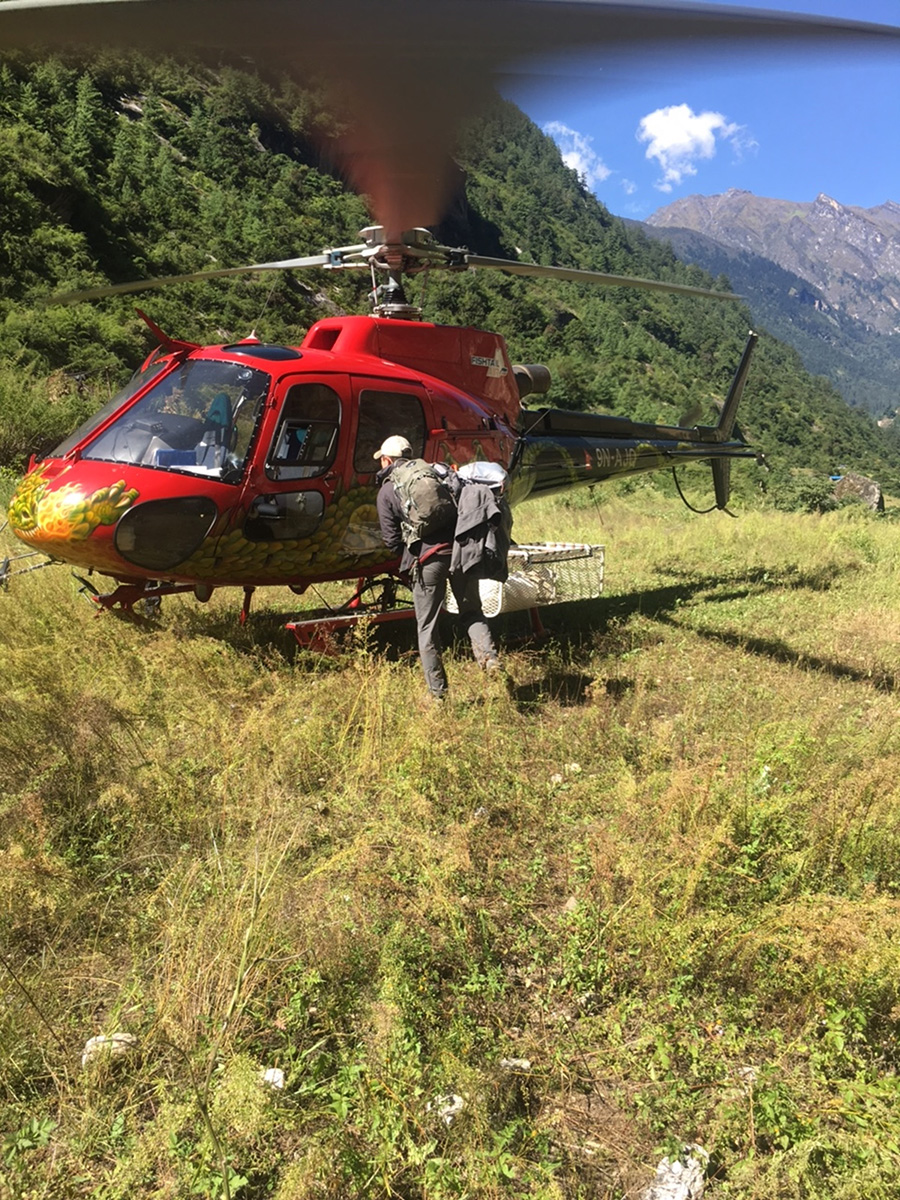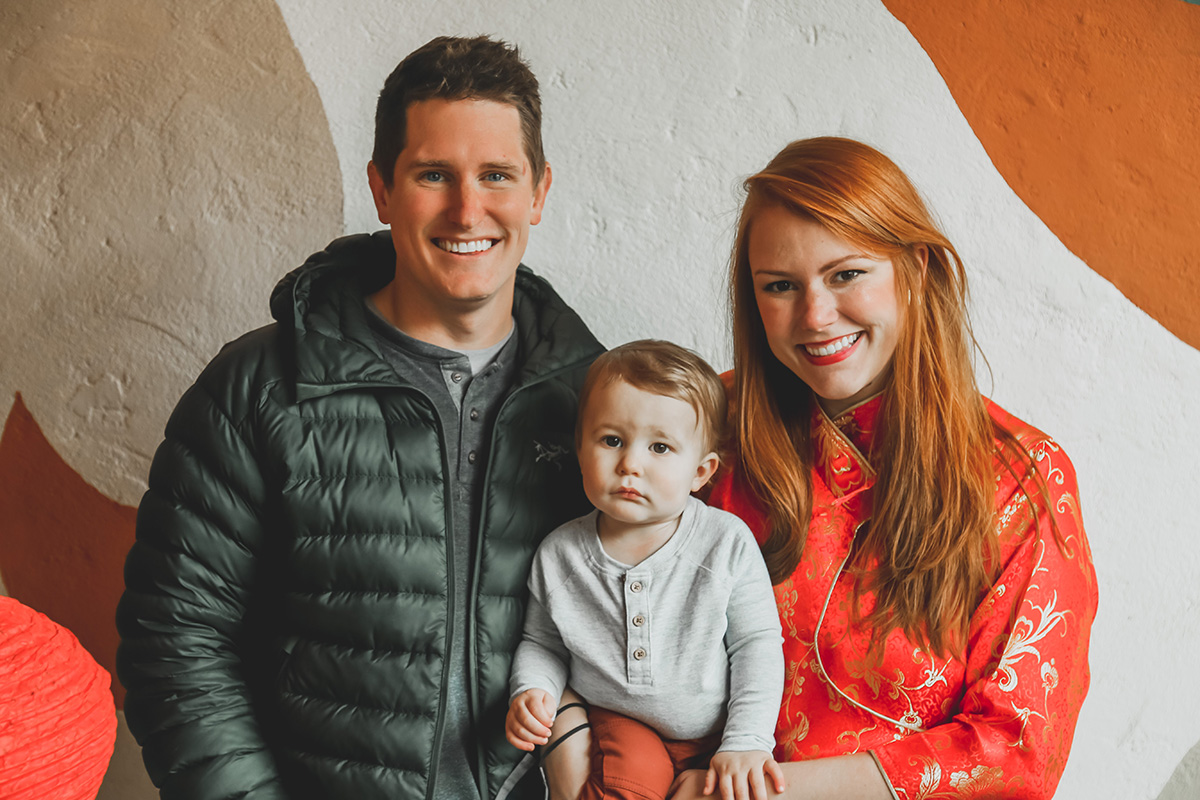Allen Nunnally needed additional business skills to be of maximum service in his career helping the people of Nepal. He joined forces with faculty and fellow students in the MBA@Nebraska program to advance his leadership, organizational and cultural awareness for his job at MountainChild, where he serves as country director in Kathmandu, Nepal.
“I had to find an MBA program that fit my niche living on the opposite side of the world,” said Nunnally. “I was always going to be on a 12-hour time difference, so my criteria was pretty strict. I couldn’t be a resident on campus and I couldn’t attend most live daytime lectures. I spent a lot of time researching programs, and Nebraska turned out to be the best option.”
 Developing a helicopter rescue program challenged Nunnally to grow professionally at MountainChild in Nepal.
Developing a helicopter rescue program challenged Nunnally to grow professionally at MountainChild in Nepal.
Nunnally, who grew up in Alabama and attended Auburn University for his undergraduate degree, traveled a long road to his current home in Nepal. His Christian faith provided the primary motivation to help others, along with guidance he received from others along the way.
“For a class assignment in college, a professor asked, ‘If it weren’t for money, what would you do in your career?’ That challenged me to define success differently because although we don’t make a lot of money, we have the richest of rewards. It’s a different type of currency. I prefer doing something where I can see an impact being built in others,” Nunnally said.
With the spirit of service rooted in his career aspirations, MountainChild and Nunnally discussed leading efforts in Nepal due to his prior work, which included an appointment working with orphans in Uganda.
“MountainChild talked to me about leadership and management work they needed, but also needs in other areas such as school projects, construction projects in the mountains, health work, water and sanitation hygiene – even developing a helicopter rescue program. All this stuff was far over my head at the time,” he said.
With each new assignment, Nunnally not only needed to learn new technical details but also essentials of how to interface with the people in Nepal, both in the large city of Kathmandu where he lives, and with the majority he serves in rural mountain areas. As part of his MBA, he took two classes from Dr. Elina Ibrayeva, associate professor of practice in management. The classes helped Nunnally gain a greater appreciation for creating effective organizational leadership in diverse cultures.
“Dr. Ibrayeva is from Kazakhstan and it was interesting to learn more about the differences in Asian cultures versus American culture. They are starkly different. Through both my personal experiences and what I learned in class, I found out I had to negotiate an entirely different way. I thought being a leader I could inject the same Western leadership model, but in Nepal, it’s more of a high power distance authority, whereas in the U.S. it’s a low power distance authority,” he said.
Nunnally quickly learned that even though he enjoyed riding his bike to work, the cultural perception of “being the boss” in Nepal required him to find other modes of transport to not bring shame upon the organization. Those little adjustments helped him relate better to the people in Nepal, and therefore, perform better in his job.
“The Leadership in a Global Context (MNGT 828) class helped me learn how to blend cultures. There are some ways I can integrate my Western culture but other times when our culture doesn’t line up, I have to put down my previous way of doing things,” Nunnally said.
Ibrayeva explained her approach of getting students to work in teams to study in an applied approach using cross-cultural scripts and scenarios to resolve cultural challenges.
 Nunnally, his wife Sarah and son Noah moved to Nepal from the U.S. because of their commitment to help others throughout the world.
Nunnally, his wife Sarah and son Noah moved to Nepal from the U.S. because of their commitment to help others throughout the world.
“My very first impression about Allen was he is a fantastic fit to work internationally because of his overall positive and kind personality, and his outstanding intellectual curiosity,” Ibrayeva said. “The class content enabled him to get a deep insight and understanding of his past and current cross-cultural interactions and view these situations in a new light. He provided multiple phenomenal real-life examples such as the high power distance and collectivism culture in Nepal.”
Classmates made an impression on Nunnally as well. The emphasis on collective learning and collaboration fit perfectly with what he needed to learn to better manage projects and people for MountainChild.
“Almost every class in the MBA@Nebraska program has assigned groups, and there’s a lot of diversity among our teams. I’ve worked with people in my classes from many nationalities and ethnicities, and who speak multiple languages. It’s great to experience people from all over the world while engaging in the Nebraska curriculum,” he said.
Nunnally uses those classroom interactions to supplement his interactions in his job to help make life better for those who have little access to health care and education. It goes back to his goals of developing his own skills to improve the lives of others.
“These are extremely remote living environments we are serving in the mountains. It causes massive delays getting education or health care into these areas. Just 15 years ago, if a rural child wanted to go to school, their parents would have to send them to Kathmandu or outside of Nepal. Children would have to start working at very young ages. Now we’re able to bring the education to them. We can run schools in their villages, and the children can walk out the front door to go to school like a child would do in Nebraska,” he said.
To learn more about the MBA@Nebraska, visit: https://business.unl.edu/mba/.
To learn more about MountainChild, visit: https://mountainchild.org/.
Published: April 14, 2021